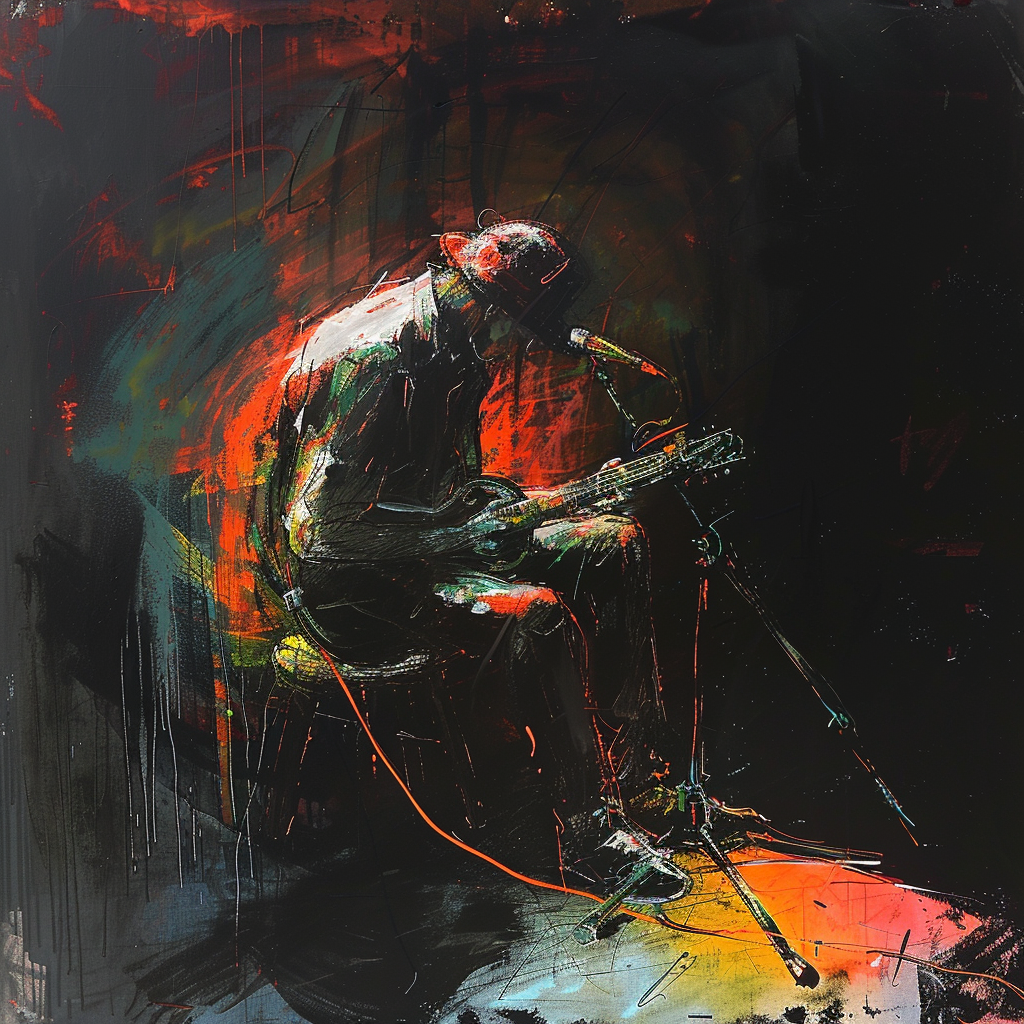In the Shadow of Giants: Unsung Heroes and Silent Geniuses Behind Rock's Loudest Legends
Image credit: Joe Daly 2024
In the blistering, chaotic world of rock 'n' roll, where the spotlight burns as fiercely as the sun over the Nevada desert, we passionately, almost religiously, glorify the frontman. The Jagger. The Morrison. The Cobain. Icons, larger than life, dripping with charisma, sex and of course, drugs. Without their bandmates, they are little more than garishly-attired pre-teens singing into a hair dryer in front of the bathroom mirror. Behind every swaggering frontman, beyond the blaze of the spotlight, lurks the true unsung hero of the rock 'n' roll circus—a spectral presence whose genius is lustily hailed among the diehards but who slips through the cracks of mainstream adulation. These shadowy virtuosos are the backbone without which, the band’s iconic roar would dissolve into the murky abyss of mediocrity. So let's tumble down the rabbit hole, where the light is dim and the air is thick with the musk of the unsung – the anti-frontman.
10. The Silent Engine - John Deacon of Queen
In the flamboyant circus of Queen, where Freddie Mercury's theatrical antics and Brian May’s fiery licks dominated the marquee, Deacon stood apart, almost invisible, his presence on stage as understated as a whisper in mortar fire. Yet, it was Deacon who engineered the throbbing undercurrent of hits like Another One Bites the Dust, wielding his bass not just as an instrument but as a covert weapon of funk and rhythm. Deacon wasn't just the band's backbone; he was its secret mastermind, crafting the hooks that propelled Queen beyond the rock stratosphere into the pop mainstream. In the shadows, he was the quiet contrarian, whose sonic innovations were pivotal yet perennially overshadowed by the more ostentatious escapades of his bandmates.
9. The Melancholic Maestro - Andy Summers of The Police
Behind the golden boy allure of Sting and the rhythmic thunder of Stewart Copeland, there stood Andy Summers, the cerebral architect wielding his guitar like a scalpel, dissecting and reassembling the sonic landscape of The Police. His minimalist, yet potent riffs on tracks like Every Breath You Take painted haunting atmospheres that lingered long after the song ended — a testament to the underappreciated genius of his craft. Summers wasn't just playing notes; he was crafting soundscapes, bending the background into an essential narrative force that propelled the band beyond the conventional rock trimmings. His ability to inject complexity through simplicity underscored a masterclass in the power of musical subtlety.
8. The Quiet Beatle - George Harrison
In the echo-laden cacophony of the Lennon-McCartney legend, George Harrison wove his quiet mysticism through the fabric of The Beatles' sound, often obscured yet piercingly distinct. His slide guitar didn’t just weep—it howled in the corners of tracks like While My Guitar Gently Weeps,” offering a gateway into a deeper, spiritual dimension that the fab four seldom explored. Harrison wasn’t just another Beatle; he was a quiet revolutionary, planting Eastern philosophy amidst Western pop, ensuring that every sitar twang and every meditative lyric expanded the band’s psychedelic horizon. Far from just adding layers, Harrison was crafting entire landscapes in the shadow of giants.
7. The Wizard of Rhythm - Bill Ward of Black Sabbath
While Ozzy Osbourne became synonymous with macabre theatrics and occult-laced madness, there in the gloomy backdrop, Bill Ward wielded his drumsticks like a sorcerer's staff. His drumming didn't just keep time; it conjured the very thunder and doom that defined Black Sabbath's pioneering sound. With his undeniable, jazz-inflected flare, Ward’s percussive genius carved out the deep, dark grooves of heavy metal, each beat a foreboding rumble that seemed to echo from the depths of another realm. Often overlooked in the shadows of Osbourne, riff lord Tony Iommi and Geezer Butler’s rumbling rhythms, Ward was the relentless force turning the gears of Black Sabbath’s engine of darkness. Without him, the band's groundbreaking charge into the genre would have been but a faint echo in the halls of rock history.
6. The Enigmatic Virtuoso - John Paul Jones of Led Zeppelin
While Plant seduced with his golden mane and wailing voice and Page slashed and thrilled with his guitar god riffs, there stood John Paul Jones, master of the understated craft. A chameleon on stage, he manipulated bass lines, keyboards and even mandolin strings to weave the dense, intricate fabric of Zeppelin’s sound. More than just a sideman, Jones was a maestro in the shadows, orchestrating the sonic depths that made anthems like The Lemon Song immortal. His contribution was quiet but pivotal, anchoring the band's explosive chemistry with a cool, calculated finesse that often eluded the spotlight’s glare but never the discerning ear.
5. The Punk Poet - Dee Dee Ramone of The Ramones
Joey Ramone might have been the lanky, spectral figurehead of punk's quintessential rebels, but it was Dee Dee who injected the venom and verve into the heart of The Ramones. Dee Dee wasn't just playing the bass; he was launching rapid-fire missives from four strings, driving the band’s frenetic anthems with a raw, unpolished fury that became the blueprint for punk. His life was a tumultuous symphony of chaos, an embodiment of the punk ethos—aggressive, unapologetic and intensely real. Dee Dee wrote the anthems that defined a movement, living out the lyrics with every fiber of his being, ensuring that punk would never die but be reborn, screaming, in the alleys and squats where its disciples gathered. Tragically, Dee Dee's tumultuous journey ended in 2002 at age 50, succumbing to a heroin overdose, a stark epitaph to a life lived on the razor's edge.
4. The Sonic Architect - Alex Lifeson of Rush
In the limelight, Geddy Lee’s voice and Neil Peart’s intricate lyrics often steal the show, but lurking within Rush's complex soundscapes is Lifeson, the unsung alchemist. His guitar is not merely an instrument; it’s a forge where auditory gold is crafted. Lifeson's riffs and solos travel through progressive rock landscapes like a phantom, both omnipresent and unnoticed, his melodies weaving the very fabric of the band’s identity. With a flick of his wrist, he commands the storm, often overlooked yet fundamentally indispensable. Without Lifeson, Rush’s sound would not soar; it would stutter.
3. Effortless Cool - Charlie Watts of The Rolling Stones
As the Stones spiraled through decades of sonic revolution, Charlie Watts sat, the unruffled soul amidst the storm, tapping out beats with the calm of a Zen master. His drums weren’t just instruments; they were the anchor in the raging sea of Mick Jagger’s gyrations and Keith Richards’ bluesy riffing. Watts played with the elegance of a jazz musician, subtly sophisticated, offering a clean, steady pulse that made the Stones' gritty sound not only possible but preternaturally poised. His drumming was a quiet riot, an understated force that kept the band's wild heart beating in perfect, paradoxical order. In 2021, in the quietude of a London hospital, surrounded by his family, Charlie Watts laid down his final beat at the age of 80, exiting the stage of life as gracefully as he had commanded it.
2. The Synth Sage - Richard Wright of Pink Floyd
Tucked away behind the existential musings of Roger Waters and the searing fretwork of David Gilmour, Wright wove the fabric of Pink Floyd's dreamscape with his spectral synths. His fingers didn't just play keys; they summoned storms, painted sunsets and whispered the cosmic truths that made albums like The Dark Side of the Moon and Wish You Were Here transcendental journeys. Wright’s presence was that of a wizard hidden in plain sight, casting spells that turned air into emotion, all while remaining a ghost in the limelight, essential yet ethereal.
1. The Bass Behemoth - Cliff Burton of Metallica
In the high-octane world of Metallica, where James Hetfield's taut riffs cut through the air like a chainsaw and Kirk Hammett's kaleidoscopic solos ignite the crowd with electric ferocity, there stood Cliff Burton, a quiet colossus wielding his bass like a battle-axe and his bell bottoms like flags of rebellion. Burton wasn’t just playing notes; he was sculpting soundscapes, blending a classical finesse with a thrasher’s edge, crafting the undercurrents that gave Metallica its seismic power. Inside the perimeter of heavy metal, Burton is celebrated as nothing less than a god. Without his critical contributions on the band's early, seminal releases, Metallica's sound might have never transcended the confines of the Bay Area. Tragically, his profound impact was cut short at just 24, when a cruel twist of fate ended his life in a fatal bus accident in Sweden, 1986—his strings silent, but his echo infinite.
In the end, these anti-frontmen, these silent warriors of rock 'n' roll, remind us that the spotlight, intoxicating as it may be, doesn't always illuminate the whole story. The truth often lies in the shadows, in the quiet, unassuming genius of those who shun the glare. In their subtlety, their understatement, they weave the intricate tapestries of sound that become the anthems of generations. They are the heartbeat, the soul, and sometimes, the very essence of what makes rock 'n' roll the relentless, pulsating beast that it is and they remind us that sometimes, the most powerful statements are those whispered in the dark.


